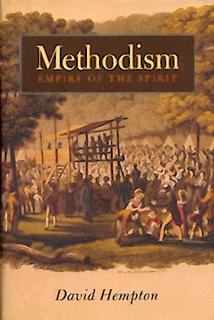 I have just written a review of this book for the history journal I help edit. It was my first review, so I felt the need to be professionally restrained. What I wanted to write was an extended rave along the lines of: This is the best book on Methodism that has ever been written. It is magnificent! It is sparkling, erudite, thoughtful and enlightening. It will transform the way Methodism is studied. David Hempton should be crowned with laurel and cheered around the academe. etc. etc.
I have just written a review of this book for the history journal I help edit. It was my first review, so I felt the need to be professionally restrained. What I wanted to write was an extended rave along the lines of: This is the best book on Methodism that has ever been written. It is magnificent! It is sparkling, erudite, thoughtful and enlightening. It will transform the way Methodism is studied. David Hempton should be crowned with laurel and cheered around the academe. etc. etc. Really, it is very good. If you are at all interested in the history of modern Christianity, you should read this. Methodism, which two hundred years of institutionalising and academic study has managed to make boring, emerges here as the fascinating, diverse, energetic movement that it was. How it grew! From a handful of followers in the 1730s, to the largest Protestant denomination in the US by the eve of the Civil War. If you include Pentecostal believers among the heirs of this movement, Methodism looks even more significant, with some scholars suggesting that there will be more than a billion Pentecostals before 2050. Methodists were involved in converting individuals, planting churches, sending missionaries and establishing educational and charitable institutions by the hundred. They have been an enormously significant cultural force in the North and South.
Why Methodism grew (and why it declined in the twentieth century); why it spread (and why it failed to take root in some places); who Methodism attracted (and who it offended) - these are the questions that Hempton explores. He thinks, for example, about the tensions within Methodism, the competition between Methodism and other movements, the way money was spent by Methodists, the relationship between Methodism and those on the margins of society. He emphasises throughout one of the most interesting aspects of Methodism - the majority presence of women in the movement. His call for more study of how this shaped Methodism is one I hope to respond to in my future work.
Anyway, read the book. It's terrific.
No comments:
Post a Comment